Globalization Factors, Technological Advances and Economic Integration
VerifiedAdded on 2023/01/18
|15
|5409
|53
Essay
AI Summary
This essay delves into the multifaceted factors that have propelled the globalization of the world economy in recent times. It begins by defining globalization and economic integration, highlighting the role of technological advancements as a driving force. The main body explores the theories and concepts underpinning international integration, such as free trade areas and cultural globalization. It then critically evaluates the key factors of globalization, including GDP, foreign direct investment, and technological innovation, while also acknowledging the negative impacts like terrorism and job insecurity. The essay further examines how modern technological advances, like e-banking and improved communication, influence and sometimes limit global economic integration. It discusses the benefits of technology in spreading knowledge and reducing trade costs, while also acknowledging the challenges of technological advancement, such as increased costs and job displacement. The essay concludes by summarizing the complex interplay of factors and offering a nuanced understanding of globalization's impact.
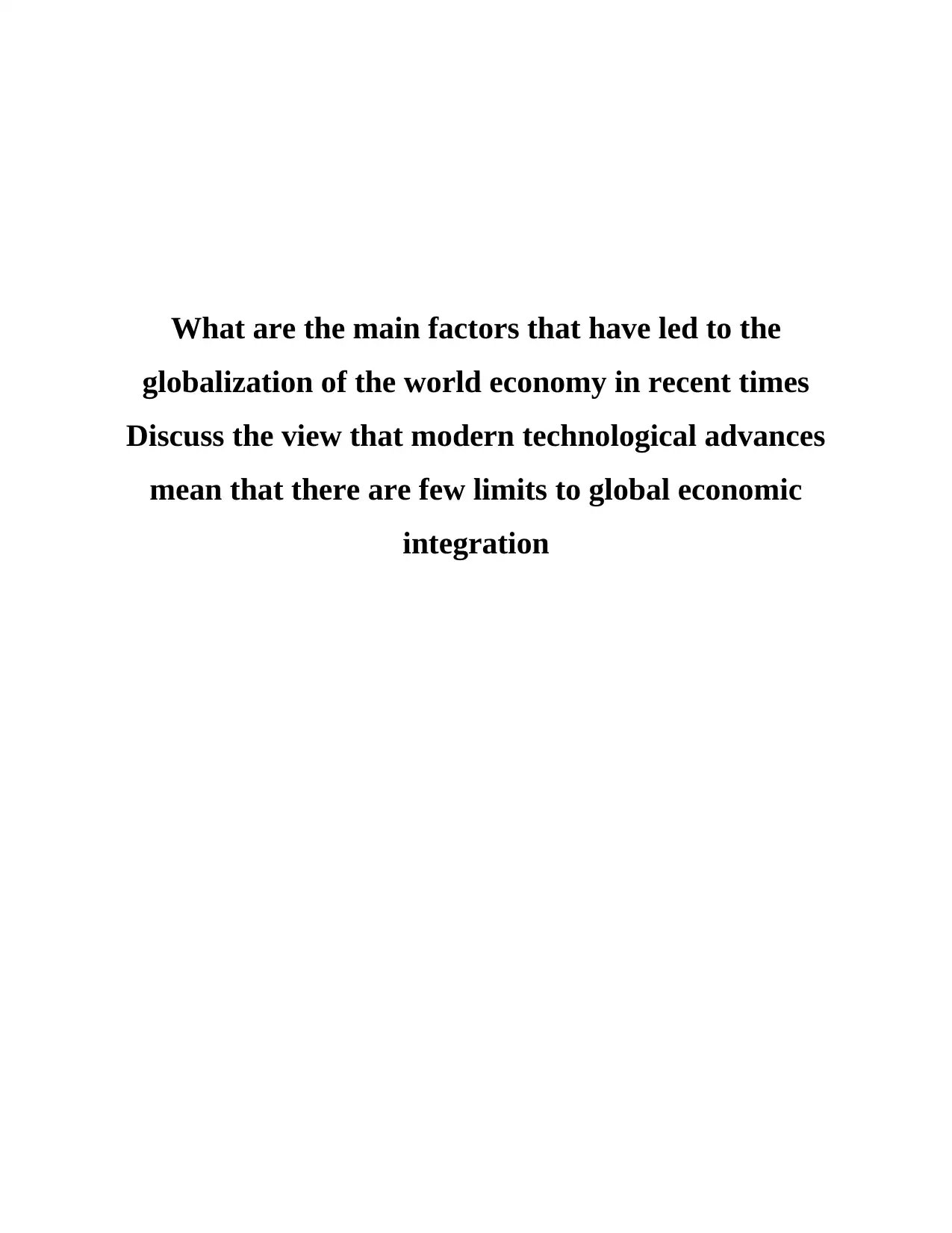
What are the main factors that have led to the
globalization of the world economy in recent times
Discuss the view that modern technological advances
mean that there are few limits to global economic
integration
globalization of the world economy in recent times
Discuss the view that modern technological advances
mean that there are few limits to global economic
integration
Paraphrase This Document
Need a fresh take? Get an instant paraphrase of this document with our AI Paraphraser
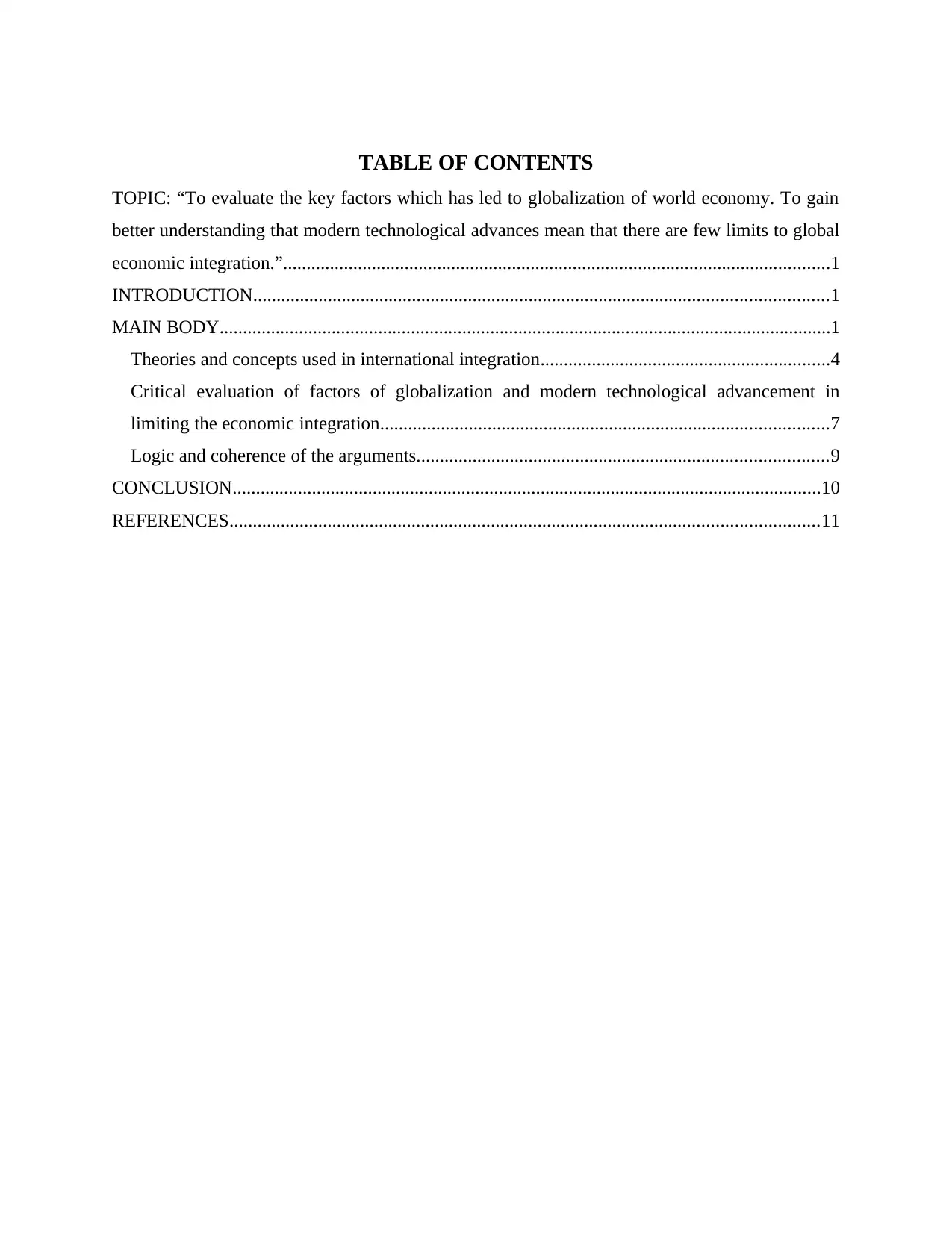
TABLE OF CONTENTS
TOPIC: “To evaluate the key factors which has led to globalization of world economy. To gain
better understanding that modern technological advances mean that there are few limits to global
economic integration.”.....................................................................................................................1
INTRODUCTION...........................................................................................................................1
MAIN BODY...................................................................................................................................1
Theories and concepts used in international integration..............................................................4
Critical evaluation of factors of globalization and modern technological advancement in
limiting the economic integration................................................................................................7
Logic and coherence of the arguments........................................................................................9
CONCLUSION..............................................................................................................................10
REFERENCES..............................................................................................................................11
TOPIC: “To evaluate the key factors which has led to globalization of world economy. To gain
better understanding that modern technological advances mean that there are few limits to global
economic integration.”.....................................................................................................................1
INTRODUCTION...........................................................................................................................1
MAIN BODY...................................................................................................................................1
Theories and concepts used in international integration..............................................................4
Critical evaluation of factors of globalization and modern technological advancement in
limiting the economic integration................................................................................................7
Logic and coherence of the arguments........................................................................................9
CONCLUSION..............................................................................................................................10
REFERENCES..............................................................................................................................11
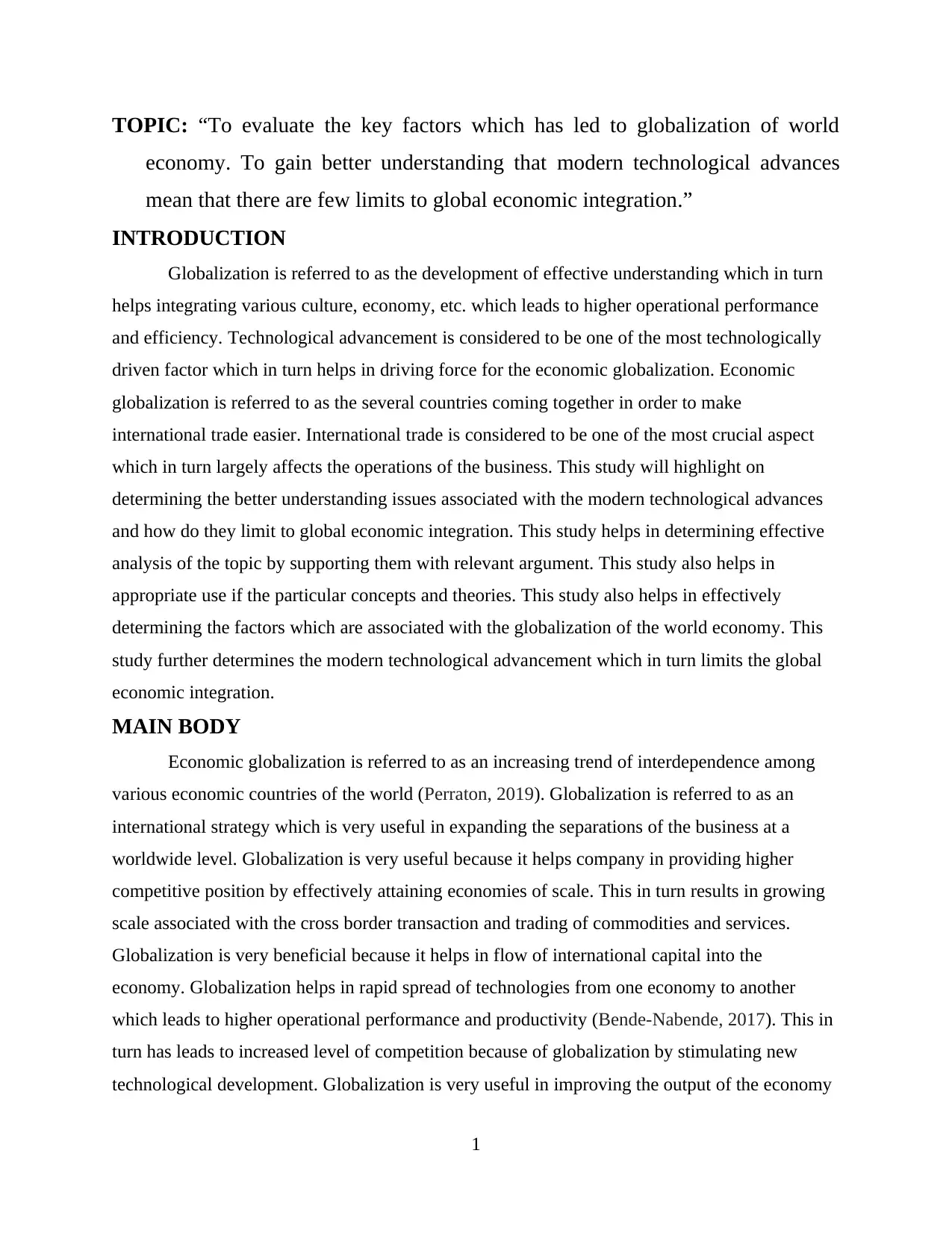
TOPIC: “To evaluate the key factors which has led to globalization of world
economy. To gain better understanding that modern technological advances
mean that there are few limits to global economic integration.”
INTRODUCTION
Globalization is referred to as the development of effective understanding which in turn
helps integrating various culture, economy, etc. which leads to higher operational performance
and efficiency. Technological advancement is considered to be one of the most technologically
driven factor which in turn helps in driving force for the economic globalization. Economic
globalization is referred to as the several countries coming together in order to make
international trade easier. International trade is considered to be one of the most crucial aspect
which in turn largely affects the operations of the business. This study will highlight on
determining the better understanding issues associated with the modern technological advances
and how do they limit to global economic integration. This study helps in determining effective
analysis of the topic by supporting them with relevant argument. This study also helps in
appropriate use if the particular concepts and theories. This study also helps in effectively
determining the factors which are associated with the globalization of the world economy. This
study further determines the modern technological advancement which in turn limits the global
economic integration.
MAIN BODY
Economic globalization is referred to as an increasing trend of interdependence among
various economic countries of the world (Perraton, 2019). Globalization is referred to as an
international strategy which is very useful in expanding the separations of the business at a
worldwide level. Globalization is very useful because it helps company in providing higher
competitive position by effectively attaining economies of scale. This in turn results in growing
scale associated with the cross border transaction and trading of commodities and services.
Globalization is very beneficial because it helps in flow of international capital into the
economy. Globalization helps in rapid spread of technologies from one economy to another
which leads to higher operational performance and productivity (Bende-Nabende, 2017). This in
turn has leads to increased level of competition because of globalization by stimulating new
technological development. Globalization is very useful in improving the output of the economy
1
economy. To gain better understanding that modern technological advances
mean that there are few limits to global economic integration.”
INTRODUCTION
Globalization is referred to as the development of effective understanding which in turn
helps integrating various culture, economy, etc. which leads to higher operational performance
and efficiency. Technological advancement is considered to be one of the most technologically
driven factor which in turn helps in driving force for the economic globalization. Economic
globalization is referred to as the several countries coming together in order to make
international trade easier. International trade is considered to be one of the most crucial aspect
which in turn largely affects the operations of the business. This study will highlight on
determining the better understanding issues associated with the modern technological advances
and how do they limit to global economic integration. This study helps in determining effective
analysis of the topic by supporting them with relevant argument. This study also helps in
appropriate use if the particular concepts and theories. This study also helps in effectively
determining the factors which are associated with the globalization of the world economy. This
study further determines the modern technological advancement which in turn limits the global
economic integration.
MAIN BODY
Economic globalization is referred to as an increasing trend of interdependence among
various economic countries of the world (Perraton, 2019). Globalization is referred to as an
international strategy which is very useful in expanding the separations of the business at a
worldwide level. Globalization is very useful because it helps company in providing higher
competitive position by effectively attaining economies of scale. This in turn results in growing
scale associated with the cross border transaction and trading of commodities and services.
Globalization is very beneficial because it helps in flow of international capital into the
economy. Globalization helps in rapid spread of technologies from one economy to another
which leads to higher operational performance and productivity (Bende-Nabende, 2017). This in
turn has leads to increased level of competition because of globalization by stimulating new
technological development. Globalization is very useful in improving the output of the economy
1
⊘ This is a preview!⊘
Do you want full access?
Subscribe today to unlock all pages.

Trusted by 1+ million students worldwide
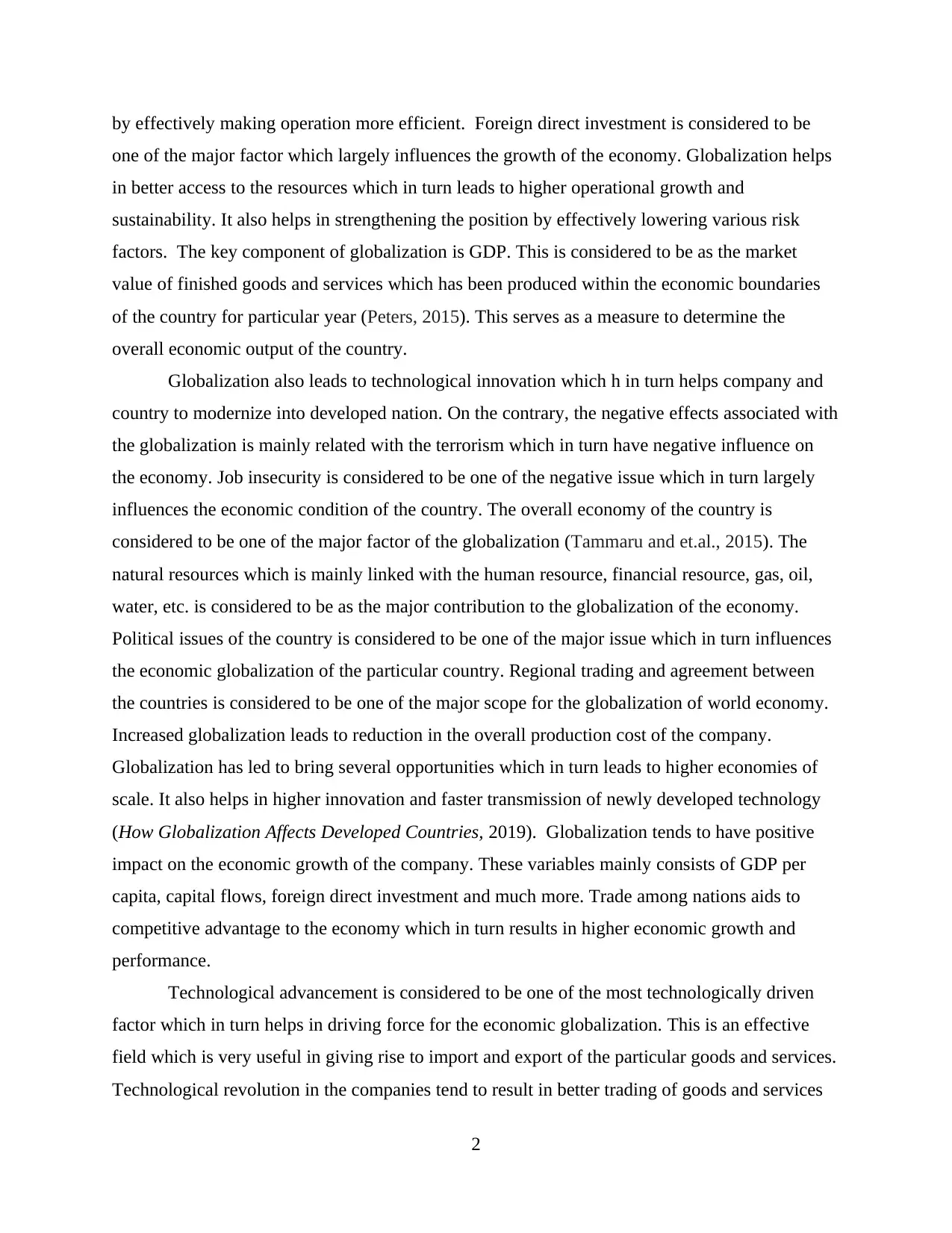
by effectively making operation more efficient. Foreign direct investment is considered to be
one of the major factor which largely influences the growth of the economy. Globalization helps
in better access to the resources which in turn leads to higher operational growth and
sustainability. It also helps in strengthening the position by effectively lowering various risk
factors. The key component of globalization is GDP. This is considered to be as the market
value of finished goods and services which has been produced within the economic boundaries
of the country for particular year (Peters, 2015). This serves as a measure to determine the
overall economic output of the country.
Globalization also leads to technological innovation which h in turn helps company and
country to modernize into developed nation. On the contrary, the negative effects associated with
the globalization is mainly related with the terrorism which in turn have negative influence on
the economy. Job insecurity is considered to be one of the negative issue which in turn largely
influences the economic condition of the country. The overall economy of the country is
considered to be one of the major factor of the globalization (Tammaru and et.al., 2015). The
natural resources which is mainly linked with the human resource, financial resource, gas, oil,
water, etc. is considered to be as the major contribution to the globalization of the economy.
Political issues of the country is considered to be one of the major issue which in turn influences
the economic globalization of the particular country. Regional trading and agreement between
the countries is considered to be one of the major scope for the globalization of world economy.
Increased globalization leads to reduction in the overall production cost of the company.
Globalization has led to bring several opportunities which in turn leads to higher economies of
scale. It also helps in higher innovation and faster transmission of newly developed technology
(How Globalization Affects Developed Countries, 2019). Globalization tends to have positive
impact on the economic growth of the company. These variables mainly consists of GDP per
capita, capital flows, foreign direct investment and much more. Trade among nations aids to
competitive advantage to the economy which in turn results in higher economic growth and
performance.
Technological advancement is considered to be one of the most technologically driven
factor which in turn helps in driving force for the economic globalization. This is an effective
field which is very useful in giving rise to import and export of the particular goods and services.
Technological revolution in the companies tend to result in better trading of goods and services
2
one of the major factor which largely influences the growth of the economy. Globalization helps
in better access to the resources which in turn leads to higher operational growth and
sustainability. It also helps in strengthening the position by effectively lowering various risk
factors. The key component of globalization is GDP. This is considered to be as the market
value of finished goods and services which has been produced within the economic boundaries
of the country for particular year (Peters, 2015). This serves as a measure to determine the
overall economic output of the country.
Globalization also leads to technological innovation which h in turn helps company and
country to modernize into developed nation. On the contrary, the negative effects associated with
the globalization is mainly related with the terrorism which in turn have negative influence on
the economy. Job insecurity is considered to be one of the negative issue which in turn largely
influences the economic condition of the country. The overall economy of the country is
considered to be one of the major factor of the globalization (Tammaru and et.al., 2015). The
natural resources which is mainly linked with the human resource, financial resource, gas, oil,
water, etc. is considered to be as the major contribution to the globalization of the economy.
Political issues of the country is considered to be one of the major issue which in turn influences
the economic globalization of the particular country. Regional trading and agreement between
the countries is considered to be one of the major scope for the globalization of world economy.
Increased globalization leads to reduction in the overall production cost of the company.
Globalization has led to bring several opportunities which in turn leads to higher economies of
scale. It also helps in higher innovation and faster transmission of newly developed technology
(How Globalization Affects Developed Countries, 2019). Globalization tends to have positive
impact on the economic growth of the company. These variables mainly consists of GDP per
capita, capital flows, foreign direct investment and much more. Trade among nations aids to
competitive advantage to the economy which in turn results in higher economic growth and
performance.
Technological advancement is considered to be one of the most technologically driven
factor which in turn helps in driving force for the economic globalization. This is an effective
field which is very useful in giving rise to import and export of the particular goods and services.
Technological revolution in the companies tend to result in better trading of goods and services
2
Paraphrase This Document
Need a fresh take? Get an instant paraphrase of this document with our AI Paraphraser

from one economy to another. On the contrary, integration of new and advanced technology
helps in revolutionizing the way particular business work. It has led to e- money, e- banking,
transfer of goods and transfer of funds with the help of internet services helps in better
performance and productivity (Schnall, Dobson, M. and Landsbergis, 2016). Development and
integration of new and advanced technology has largely influenced world trade which in turn is
very useful in bridging the gap associated with the space and time. One of the key potential
benefit associated with the globalization is that it aids in providing higher opportunities and it is
very useful in reducing the macroeconomic volatility on consumption and output with the help of
diversification of risk. Technology plays a key role in spreading growth potential and knowledge
between countries. This helps in effectively building capacity to absorb knowledge and also
efficiently utilize foreign knowledge (Bhattacharya, Rafiq and Bhattacharya, 2015). Global
economic integration is considered to be an effective measure which helps in effectively
reducing the cost of trade. Economic integration is useful as it helps in improving the cost of
trade of goods and services. Globalization through the cross boarder transaction and trading of
commodities and services. Global economic integration helps in technological sharing which in
turn leads to higher sustainable growth and efficiency of the business. Improvement and
advancement in technology has led to better transportation and communication. Technological
advancement is considered to be one of the major facilitator of the globalization process. Global
integration helps in standardization of the products and centralization of the technology
development. On the contrary, advancement in technology into the economy has lead to higher
cost for the business. It also leads to lower employment levels which in turn largely influence the
global economic integration (Jawahir and Bradley, 2016). It is very useful in trade of goods and
services which in turn largely influences the performance and productivity of the services.
Technological progress helps in improving the quality of the business. Technology tends
to have negative impact on the society which in turn largely limits the global economic
integration. Technology advancement largely impact the various number of jobs in the economy
which in turn largely limit the global economic integration (Bhattacharya, Rafiq and
Bhattacharya, 2015). Due to continuous technology advancement the employees of the company
needs to undergo continuous training and development programs. Economies or countries who
are not able to adapt to advanced technology tend to largely limit the growth of the company.
International trade is considered to be one of the most crucial aspect which in turn largely affects
3
helps in revolutionizing the way particular business work. It has led to e- money, e- banking,
transfer of goods and transfer of funds with the help of internet services helps in better
performance and productivity (Schnall, Dobson, M. and Landsbergis, 2016). Development and
integration of new and advanced technology has largely influenced world trade which in turn is
very useful in bridging the gap associated with the space and time. One of the key potential
benefit associated with the globalization is that it aids in providing higher opportunities and it is
very useful in reducing the macroeconomic volatility on consumption and output with the help of
diversification of risk. Technology plays a key role in spreading growth potential and knowledge
between countries. This helps in effectively building capacity to absorb knowledge and also
efficiently utilize foreign knowledge (Bhattacharya, Rafiq and Bhattacharya, 2015). Global
economic integration is considered to be an effective measure which helps in effectively
reducing the cost of trade. Economic integration is useful as it helps in improving the cost of
trade of goods and services. Globalization through the cross boarder transaction and trading of
commodities and services. Global economic integration helps in technological sharing which in
turn leads to higher sustainable growth and efficiency of the business. Improvement and
advancement in technology has led to better transportation and communication. Technological
advancement is considered to be one of the major facilitator of the globalization process. Global
integration helps in standardization of the products and centralization of the technology
development. On the contrary, advancement in technology into the economy has lead to higher
cost for the business. It also leads to lower employment levels which in turn largely influence the
global economic integration (Jawahir and Bradley, 2016). It is very useful in trade of goods and
services which in turn largely influences the performance and productivity of the services.
Technological progress helps in improving the quality of the business. Technology tends
to have negative impact on the society which in turn largely limits the global economic
integration. Technology advancement largely impact the various number of jobs in the economy
which in turn largely limit the global economic integration (Bhattacharya, Rafiq and
Bhattacharya, 2015). Due to continuous technology advancement the employees of the company
needs to undergo continuous training and development programs. Economies or countries who
are not able to adapt to advanced technology tend to largely limit the growth of the company.
International trade is considered to be one of the most crucial aspect which in turn largely affects
3
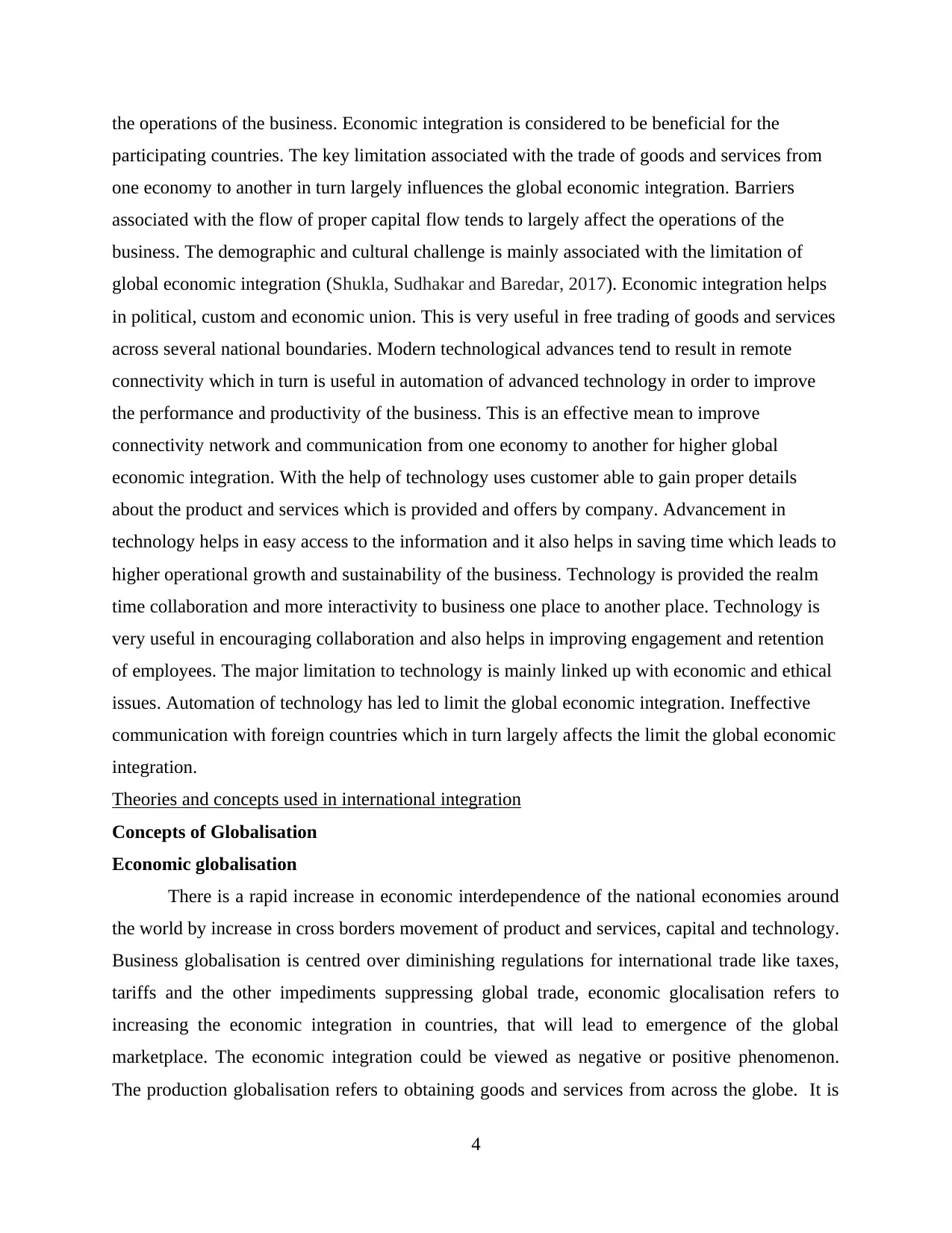
the operations of the business. Economic integration is considered to be beneficial for the
participating countries. The key limitation associated with the trade of goods and services from
one economy to another in turn largely influences the global economic integration. Barriers
associated with the flow of proper capital flow tends to largely affect the operations of the
business. The demographic and cultural challenge is mainly associated with the limitation of
global economic integration (Shukla, Sudhakar and Baredar, 2017). Economic integration helps
in political, custom and economic union. This is very useful in free trading of goods and services
across several national boundaries. Modern technological advances tend to result in remote
connectivity which in turn is useful in automation of advanced technology in order to improve
the performance and productivity of the business. This is an effective mean to improve
connectivity network and communication from one economy to another for higher global
economic integration. With the help of technology uses customer able to gain proper details
about the product and services which is provided and offers by company. Advancement in
technology helps in easy access to the information and it also helps in saving time which leads to
higher operational growth and sustainability of the business. Technology is provided the realm
time collaboration and more interactivity to business one place to another place. Technology is
very useful in encouraging collaboration and also helps in improving engagement and retention
of employees. The major limitation to technology is mainly linked up with economic and ethical
issues. Automation of technology has led to limit the global economic integration. Ineffective
communication with foreign countries which in turn largely affects the limit the global economic
integration.
Theories and concepts used in international integration
Concepts of Globalisation
Economic globalisation
There is a rapid increase in economic interdependence of the national economies around
the world by increase in cross borders movement of product and services, capital and technology.
Business globalisation is centred over diminishing regulations for international trade like taxes,
tariffs and the other impediments suppressing global trade, economic glocalisation refers to
increasing the economic integration in countries, that will lead to emergence of the global
marketplace. The economic integration could be viewed as negative or positive phenomenon.
The production globalisation refers to obtaining goods and services from across the globe. It is
4
participating countries. The key limitation associated with the trade of goods and services from
one economy to another in turn largely influences the global economic integration. Barriers
associated with the flow of proper capital flow tends to largely affect the operations of the
business. The demographic and cultural challenge is mainly associated with the limitation of
global economic integration (Shukla, Sudhakar and Baredar, 2017). Economic integration helps
in political, custom and economic union. This is very useful in free trading of goods and services
across several national boundaries. Modern technological advances tend to result in remote
connectivity which in turn is useful in automation of advanced technology in order to improve
the performance and productivity of the business. This is an effective mean to improve
connectivity network and communication from one economy to another for higher global
economic integration. With the help of technology uses customer able to gain proper details
about the product and services which is provided and offers by company. Advancement in
technology helps in easy access to the information and it also helps in saving time which leads to
higher operational growth and sustainability of the business. Technology is provided the realm
time collaboration and more interactivity to business one place to another place. Technology is
very useful in encouraging collaboration and also helps in improving engagement and retention
of employees. The major limitation to technology is mainly linked up with economic and ethical
issues. Automation of technology has led to limit the global economic integration. Ineffective
communication with foreign countries which in turn largely affects the limit the global economic
integration.
Theories and concepts used in international integration
Concepts of Globalisation
Economic globalisation
There is a rapid increase in economic interdependence of the national economies around
the world by increase in cross borders movement of product and services, capital and technology.
Business globalisation is centred over diminishing regulations for international trade like taxes,
tariffs and the other impediments suppressing global trade, economic glocalisation refers to
increasing the economic integration in countries, that will lead to emergence of the global
marketplace. The economic integration could be viewed as negative or positive phenomenon.
The production globalisation refers to obtaining goods and services from across the globe. It is
4
⊘ This is a preview!⊘
Do you want full access?
Subscribe today to unlock all pages.

Trusted by 1+ million students worldwide
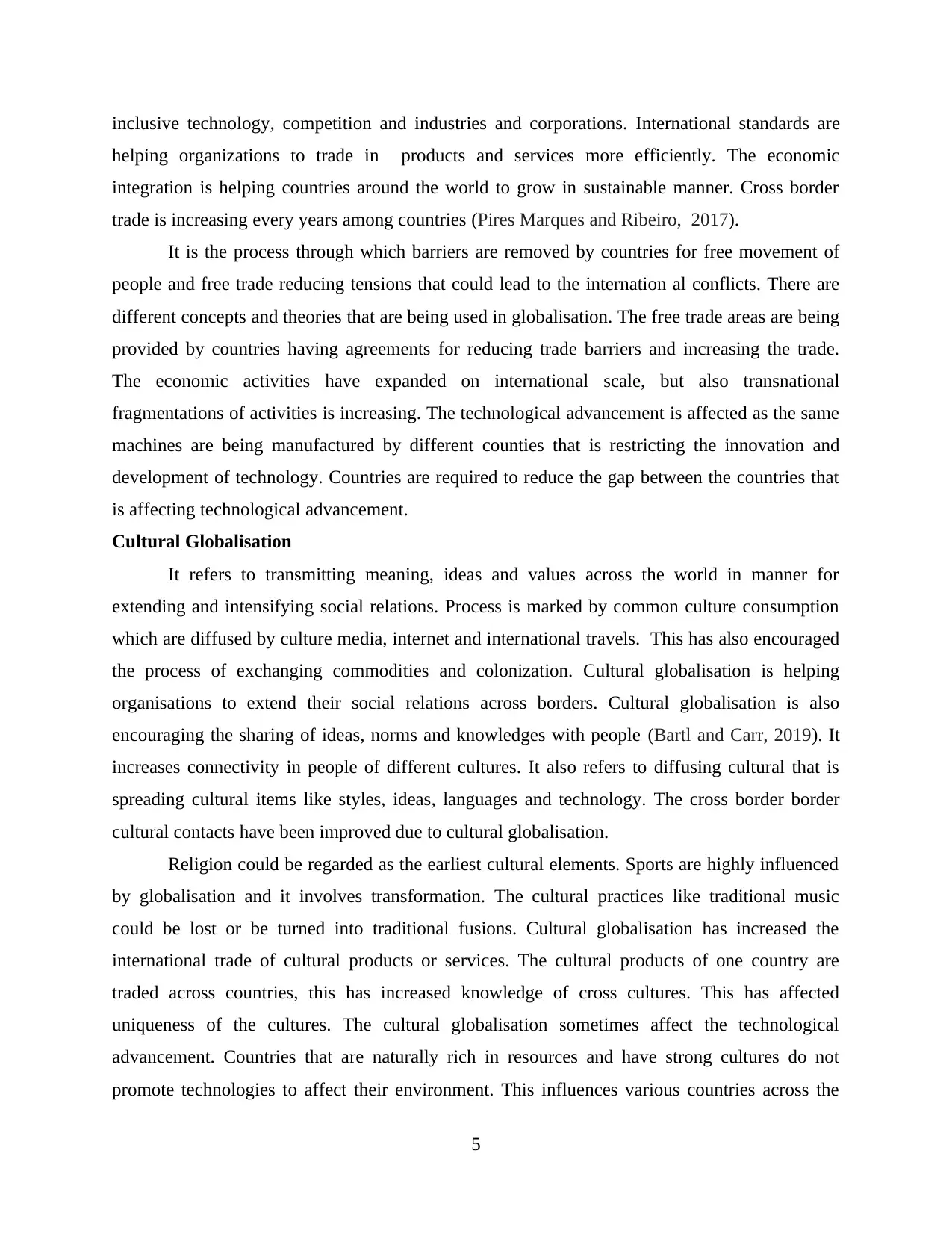
inclusive technology, competition and industries and corporations. International standards are
helping organizations to trade in products and services more efficiently. The economic
integration is helping countries around the world to grow in sustainable manner. Cross border
trade is increasing every years among countries (Pires Marques and Ribeiro, 2017).
It is the process through which barriers are removed by countries for free movement of
people and free trade reducing tensions that could lead to the internation al conflicts. There are
different concepts and theories that are being used in globalisation. The free trade areas are being
provided by countries having agreements for reducing trade barriers and increasing the trade.
The economic activities have expanded on international scale, but also transnational
fragmentations of activities is increasing. The technological advancement is affected as the same
machines are being manufactured by different counties that is restricting the innovation and
development of technology. Countries are required to reduce the gap between the countries that
is affecting technological advancement.
Cultural Globalisation
It refers to transmitting meaning, ideas and values across the world in manner for
extending and intensifying social relations. Process is marked by common culture consumption
which are diffused by culture media, internet and international travels. This has also encouraged
the process of exchanging commodities and colonization. Cultural globalisation is helping
organisations to extend their social relations across borders. Cultural globalisation is also
encouraging the sharing of ideas, norms and knowledges with people (Bartl and Carr, 2019). It
increases connectivity in people of different cultures. It also refers to diffusing cultural that is
spreading cultural items like styles, ideas, languages and technology. The cross border border
cultural contacts have been improved due to cultural globalisation.
Religion could be regarded as the earliest cultural elements. Sports are highly influenced
by globalisation and it involves transformation. The cultural practices like traditional music
could be lost or be turned into traditional fusions. Cultural globalisation has increased the
international trade of cultural products or services. The cultural products of one country are
traded across countries, this has increased knowledge of cross cultures. This has affected
uniqueness of the cultures. The cultural globalisation sometimes affect the technological
advancement. Countries that are naturally rich in resources and have strong cultures do not
promote technologies to affect their environment. This influences various countries across the
5
helping organizations to trade in products and services more efficiently. The economic
integration is helping countries around the world to grow in sustainable manner. Cross border
trade is increasing every years among countries (Pires Marques and Ribeiro, 2017).
It is the process through which barriers are removed by countries for free movement of
people and free trade reducing tensions that could lead to the internation al conflicts. There are
different concepts and theories that are being used in globalisation. The free trade areas are being
provided by countries having agreements for reducing trade barriers and increasing the trade.
The economic activities have expanded on international scale, but also transnational
fragmentations of activities is increasing. The technological advancement is affected as the same
machines are being manufactured by different counties that is restricting the innovation and
development of technology. Countries are required to reduce the gap between the countries that
is affecting technological advancement.
Cultural Globalisation
It refers to transmitting meaning, ideas and values across the world in manner for
extending and intensifying social relations. Process is marked by common culture consumption
which are diffused by culture media, internet and international travels. This has also encouraged
the process of exchanging commodities and colonization. Cultural globalisation is helping
organisations to extend their social relations across borders. Cultural globalisation is also
encouraging the sharing of ideas, norms and knowledges with people (Bartl and Carr, 2019). It
increases connectivity in people of different cultures. It also refers to diffusing cultural that is
spreading cultural items like styles, ideas, languages and technology. The cross border border
cultural contacts have been improved due to cultural globalisation.
Religion could be regarded as the earliest cultural elements. Sports are highly influenced
by globalisation and it involves transformation. The cultural practices like traditional music
could be lost or be turned into traditional fusions. Cultural globalisation has increased the
international trade of cultural products or services. The cultural products of one country are
traded across countries, this has increased knowledge of cross cultures. This has affected
uniqueness of the cultures. The cultural globalisation sometimes affect the technological
advancement. Countries that are naturally rich in resources and have strong cultures do not
promote technologies to affect their environment. This influences various countries across the
5
Paraphrase This Document
Need a fresh take? Get an instant paraphrase of this document with our AI Paraphraser
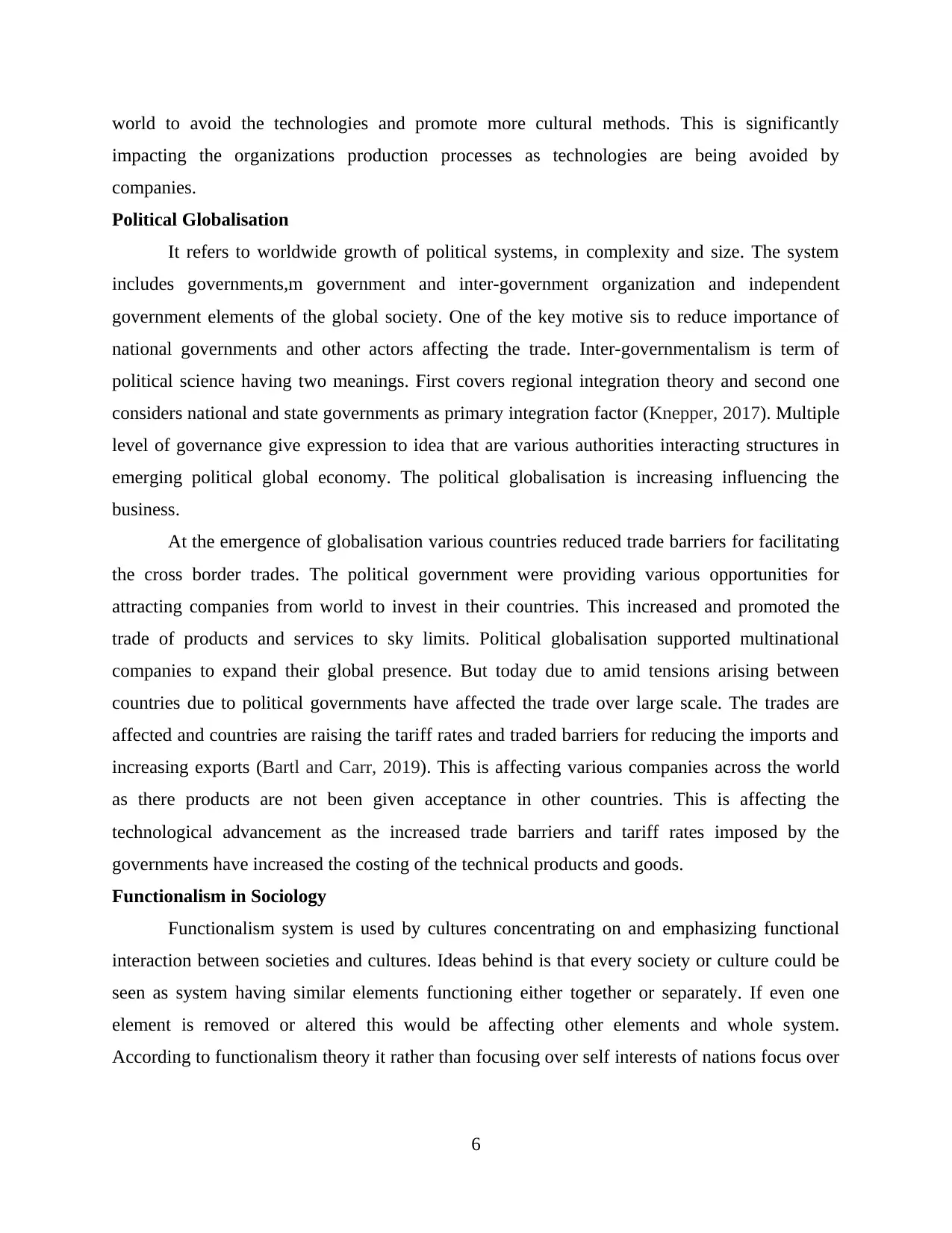
world to avoid the technologies and promote more cultural methods. This is significantly
impacting the organizations production processes as technologies are being avoided by
companies.
Political Globalisation
It refers to worldwide growth of political systems, in complexity and size. The system
includes governments,m government and inter-government organization and independent
government elements of the global society. One of the key motive sis to reduce importance of
national governments and other actors affecting the trade. Inter-governmentalism is term of
political science having two meanings. First covers regional integration theory and second one
considers national and state governments as primary integration factor (Knepper, 2017). Multiple
level of governance give expression to idea that are various authorities interacting structures in
emerging political global economy. The political globalisation is increasing influencing the
business.
At the emergence of globalisation various countries reduced trade barriers for facilitating
the cross border trades. The political government were providing various opportunities for
attracting companies from world to invest in their countries. This increased and promoted the
trade of products and services to sky limits. Political globalisation supported multinational
companies to expand their global presence. But today due to amid tensions arising between
countries due to political governments have affected the trade over large scale. The trades are
affected and countries are raising the tariff rates and traded barriers for reducing the imports and
increasing exports (Bartl and Carr, 2019). This is affecting various companies across the world
as there products are not been given acceptance in other countries. This is affecting the
technological advancement as the increased trade barriers and tariff rates imposed by the
governments have increased the costing of the technical products and goods.
Functionalism in Sociology
Functionalism system is used by cultures concentrating on and emphasizing functional
interaction between societies and cultures. Ideas behind is that every society or culture could be
seen as system having similar elements functioning either together or separately. If even one
element is removed or altered this would be affecting other elements and whole system.
According to functionalism theory it rather than focusing over self interests of nations focus over
6
impacting the organizations production processes as technologies are being avoided by
companies.
Political Globalisation
It refers to worldwide growth of political systems, in complexity and size. The system
includes governments,m government and inter-government organization and independent
government elements of the global society. One of the key motive sis to reduce importance of
national governments and other actors affecting the trade. Inter-governmentalism is term of
political science having two meanings. First covers regional integration theory and second one
considers national and state governments as primary integration factor (Knepper, 2017). Multiple
level of governance give expression to idea that are various authorities interacting structures in
emerging political global economy. The political globalisation is increasing influencing the
business.
At the emergence of globalisation various countries reduced trade barriers for facilitating
the cross border trades. The political government were providing various opportunities for
attracting companies from world to invest in their countries. This increased and promoted the
trade of products and services to sky limits. Political globalisation supported multinational
companies to expand their global presence. But today due to amid tensions arising between
countries due to political governments have affected the trade over large scale. The trades are
affected and countries are raising the tariff rates and traded barriers for reducing the imports and
increasing exports (Bartl and Carr, 2019). This is affecting various companies across the world
as there products are not been given acceptance in other countries. This is affecting the
technological advancement as the increased trade barriers and tariff rates imposed by the
governments have increased the costing of the technical products and goods.
Functionalism in Sociology
Functionalism system is used by cultures concentrating on and emphasizing functional
interaction between societies and cultures. Ideas behind is that every society or culture could be
seen as system having similar elements functioning either together or separately. If even one
element is removed or altered this would be affecting other elements and whole system.
According to functionalism theory it rather than focusing over self interests of nations focus over
6
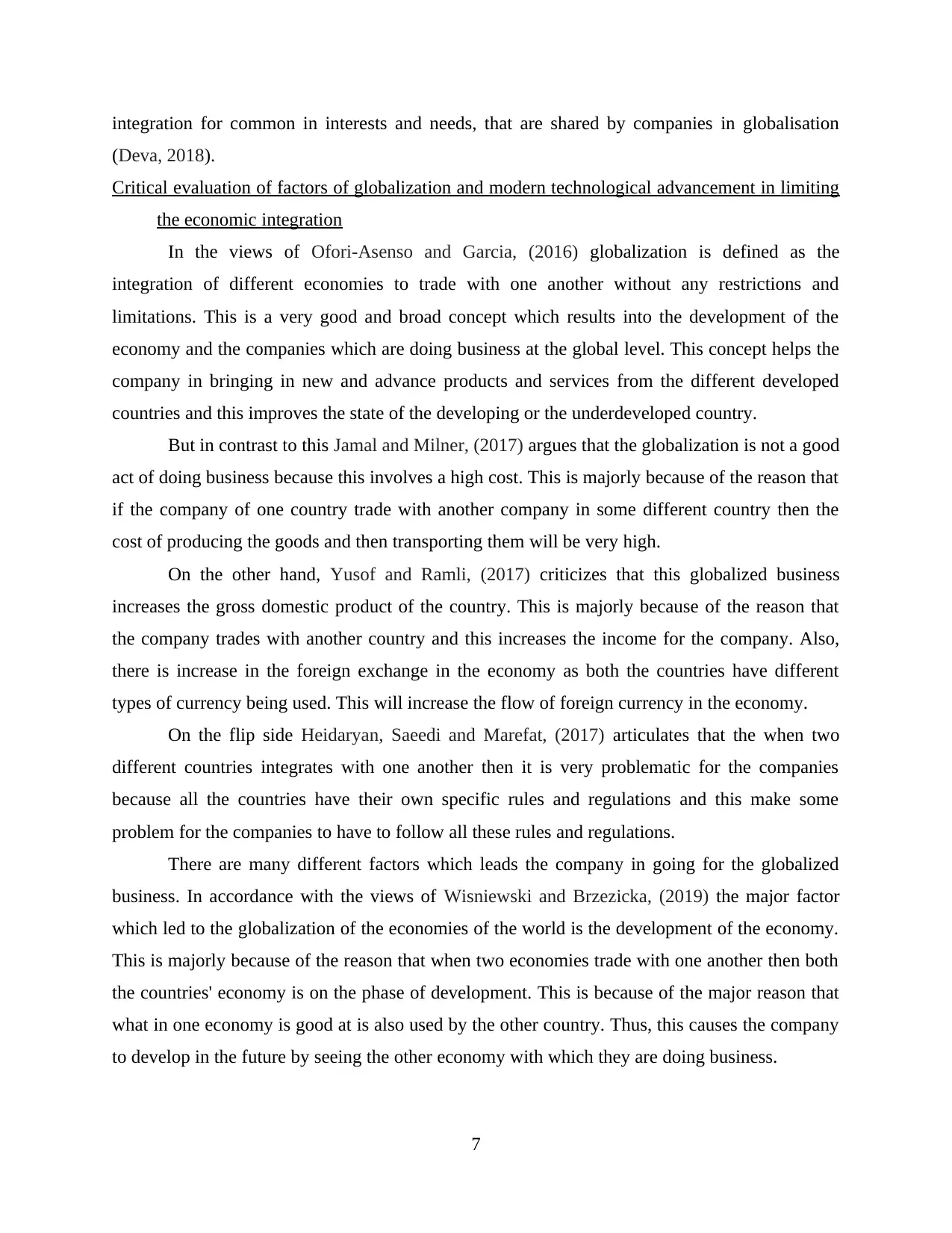
integration for common in interests and needs, that are shared by companies in globalisation
(Deva, 2018).
Critical evaluation of factors of globalization and modern technological advancement in limiting
the economic integration
In the views of Ofori-Asenso and Garcia, (2016) globalization is defined as the
integration of different economies to trade with one another without any restrictions and
limitations. This is a very good and broad concept which results into the development of the
economy and the companies which are doing business at the global level. This concept helps the
company in bringing in new and advance products and services from the different developed
countries and this improves the state of the developing or the underdeveloped country.
But in contrast to this Jamal and Milner, (2017) argues that the globalization is not a good
act of doing business because this involves a high cost. This is majorly because of the reason that
if the company of one country trade with another company in some different country then the
cost of producing the goods and then transporting them will be very high.
On the other hand, Yusof and Ramli, (2017) criticizes that this globalized business
increases the gross domestic product of the country. This is majorly because of the reason that
the company trades with another country and this increases the income for the company. Also,
there is increase in the foreign exchange in the economy as both the countries have different
types of currency being used. This will increase the flow of foreign currency in the economy.
On the flip side Heidaryan, Saeedi and Marefat, (2017) articulates that the when two
different countries integrates with one another then it is very problematic for the companies
because all the countries have their own specific rules and regulations and this make some
problem for the companies to have to follow all these rules and regulations.
There are many different factors which leads the company in going for the globalized
business. In accordance with the views of Wisniewski and Brzezicka, (2019) the major factor
which led to the globalization of the economies of the world is the development of the economy.
This is majorly because of the reason that when two economies trade with one another then both
the countries' economy is on the phase of development. This is because of the major reason that
what in one economy is good at is also used by the other country. Thus, this causes the company
to develop in the future by seeing the other economy with which they are doing business.
7
(Deva, 2018).
Critical evaluation of factors of globalization and modern technological advancement in limiting
the economic integration
In the views of Ofori-Asenso and Garcia, (2016) globalization is defined as the
integration of different economies to trade with one another without any restrictions and
limitations. This is a very good and broad concept which results into the development of the
economy and the companies which are doing business at the global level. This concept helps the
company in bringing in new and advance products and services from the different developed
countries and this improves the state of the developing or the underdeveloped country.
But in contrast to this Jamal and Milner, (2017) argues that the globalization is not a good
act of doing business because this involves a high cost. This is majorly because of the reason that
if the company of one country trade with another company in some different country then the
cost of producing the goods and then transporting them will be very high.
On the other hand, Yusof and Ramli, (2017) criticizes that this globalized business
increases the gross domestic product of the country. This is majorly because of the reason that
the company trades with another country and this increases the income for the company. Also,
there is increase in the foreign exchange in the economy as both the countries have different
types of currency being used. This will increase the flow of foreign currency in the economy.
On the flip side Heidaryan, Saeedi and Marefat, (2017) articulates that the when two
different countries integrates with one another then it is very problematic for the companies
because all the countries have their own specific rules and regulations and this make some
problem for the companies to have to follow all these rules and regulations.
There are many different factors which leads the company in going for the globalized
business. In accordance with the views of Wisniewski and Brzezicka, (2019) the major factor
which led to the globalization of the economies of the world is the development of the economy.
This is majorly because of the reason that when two economies trade with one another then both
the countries' economy is on the phase of development. This is because of the major reason that
what in one economy is good at is also used by the other country. Thus, this causes the company
to develop in the future by seeing the other economy with which they are doing business.
7
⊘ This is a preview!⊘
Do you want full access?
Subscribe today to unlock all pages.

Trusted by 1+ million students worldwide
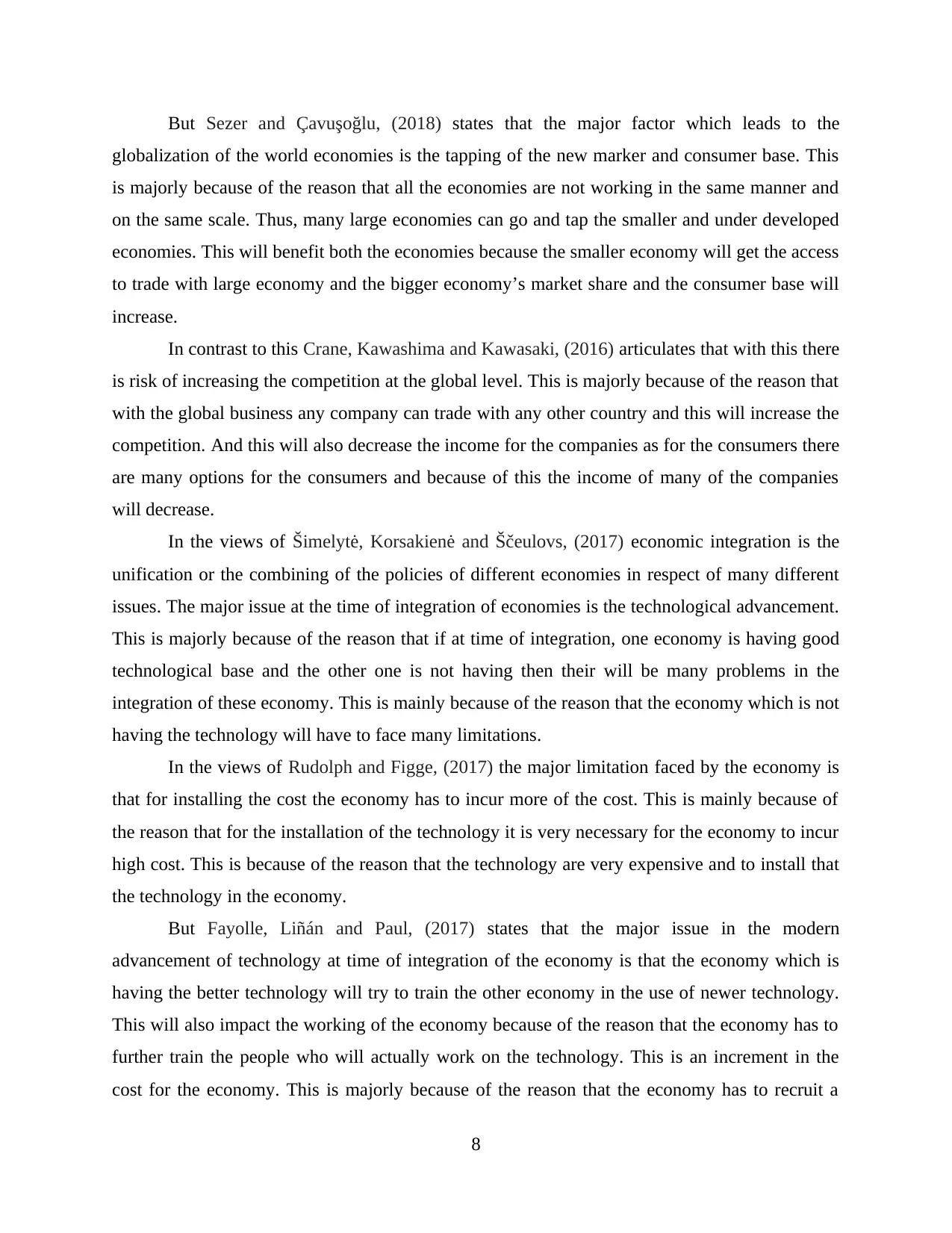
But Sezer and Çavuşoğlu, (2018) states that the major factor which leads to the
globalization of the world economies is the tapping of the new marker and consumer base. This
is majorly because of the reason that all the economies are not working in the same manner and
on the same scale. Thus, many large economies can go and tap the smaller and under developed
economies. This will benefit both the economies because the smaller economy will get the access
to trade with large economy and the bigger economy’s market share and the consumer base will
increase.
In contrast to this Crane, Kawashima and Kawasaki, (2016) articulates that with this there
is risk of increasing the competition at the global level. This is majorly because of the reason that
with the global business any company can trade with any other country and this will increase the
competition. And this will also decrease the income for the companies as for the consumers there
are many options for the consumers and because of this the income of many of the companies
will decrease.
In the views of Šimelytė, Korsakienė and Ščeulovs, (2017) economic integration is the
unification or the combining of the policies of different economies in respect of many different
issues. The major issue at the time of integration of economies is the technological advancement.
This is majorly because of the reason that if at time of integration, one economy is having good
technological base and the other one is not having then their will be many problems in the
integration of these economy. This is mainly because of the reason that the economy which is not
having the technology will have to face many limitations.
In the views of Rudolph and Figge, (2017) the major limitation faced by the economy is
that for installing the cost the economy has to incur more of the cost. This is mainly because of
the reason that for the installation of the technology it is very necessary for the economy to incur
high cost. This is because of the reason that the technology are very expensive and to install that
the technology in the economy.
But Fayolle, Liñán and Paul, (2017) states that the major issue in the modern
advancement of technology at time of integration of the economy is that the economy which is
having the better technology will try to train the other economy in the use of newer technology.
This will also impact the working of the economy because of the reason that the economy has to
further train the people who will actually work on the technology. This is an increment in the
cost for the economy. This is majorly because of the reason that the economy has to recruit a
8
globalization of the world economies is the tapping of the new marker and consumer base. This
is majorly because of the reason that all the economies are not working in the same manner and
on the same scale. Thus, many large economies can go and tap the smaller and under developed
economies. This will benefit both the economies because the smaller economy will get the access
to trade with large economy and the bigger economy’s market share and the consumer base will
increase.
In contrast to this Crane, Kawashima and Kawasaki, (2016) articulates that with this there
is risk of increasing the competition at the global level. This is majorly because of the reason that
with the global business any company can trade with any other country and this will increase the
competition. And this will also decrease the income for the companies as for the consumers there
are many options for the consumers and because of this the income of many of the companies
will decrease.
In the views of Šimelytė, Korsakienė and Ščeulovs, (2017) economic integration is the
unification or the combining of the policies of different economies in respect of many different
issues. The major issue at the time of integration of economies is the technological advancement.
This is majorly because of the reason that if at time of integration, one economy is having good
technological base and the other one is not having then their will be many problems in the
integration of these economy. This is mainly because of the reason that the economy which is not
having the technology will have to face many limitations.
In the views of Rudolph and Figge, (2017) the major limitation faced by the economy is
that for installing the cost the economy has to incur more of the cost. This is mainly because of
the reason that for the installation of the technology it is very necessary for the economy to incur
high cost. This is because of the reason that the technology are very expensive and to install that
the technology in the economy.
But Fayolle, Liñán and Paul, (2017) states that the major issue in the modern
advancement of technology at time of integration of the economy is that the economy which is
having the better technology will try to train the other economy in the use of newer technology.
This will also impact the working of the economy because of the reason that the economy has to
further train the people who will actually work on the technology. This is an increment in the
cost for the economy. This is majorly because of the reason that the economy has to recruit a
8
Paraphrase This Document
Need a fresh take? Get an instant paraphrase of this document with our AI Paraphraser
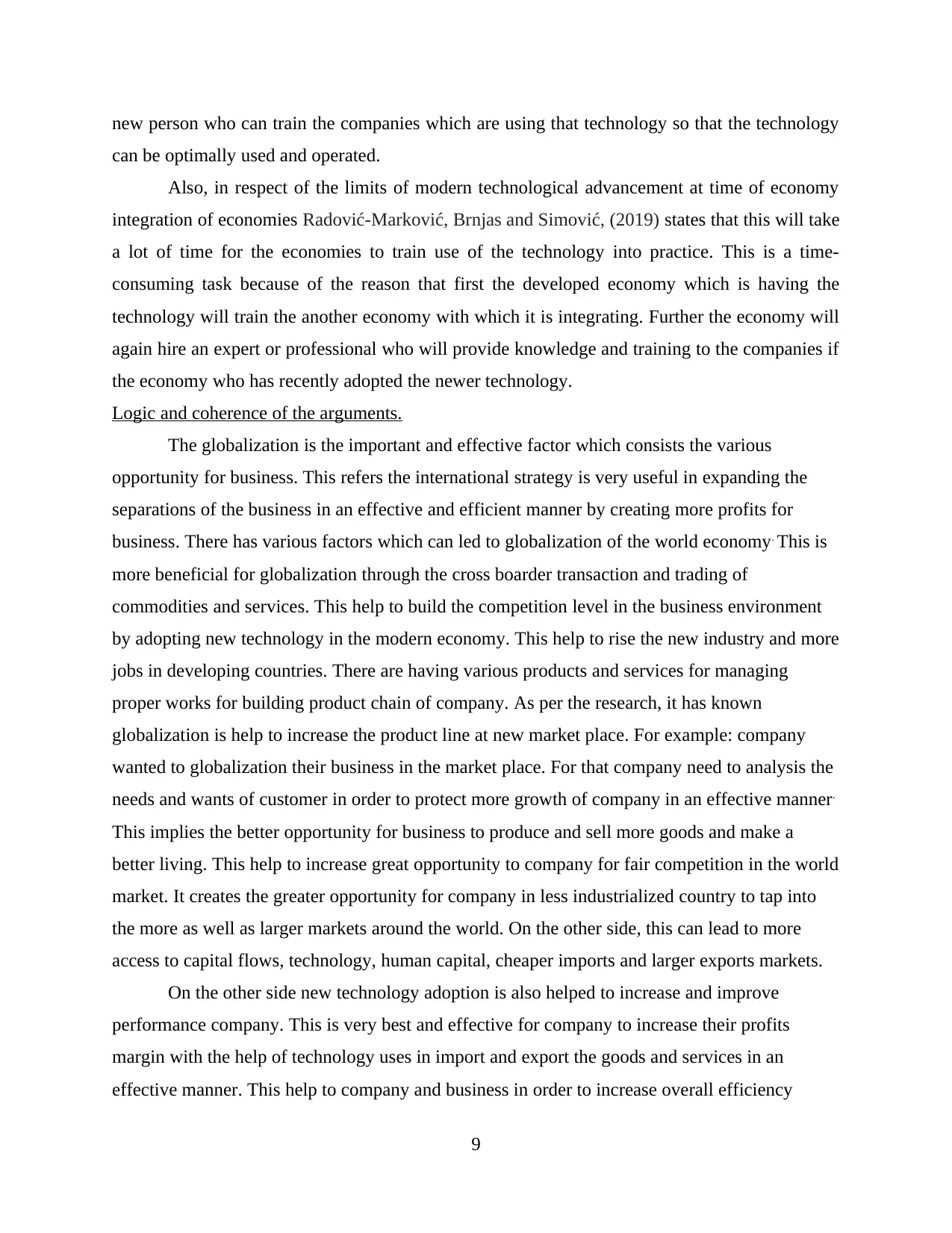
new person who can train the companies which are using that technology so that the technology
can be optimally used and operated.
Also, in respect of the limits of modern technological advancement at time of economy
integration of economies Radović-Marković, Brnjas and Simović, (2019) states that this will take
a lot of time for the economies to train use of the technology into practice. This is a time-
consuming task because of the reason that first the developed economy which is having the
technology will train the another economy with which it is integrating. Further the economy will
again hire an expert or professional who will provide knowledge and training to the companies if
the economy who has recently adopted the newer technology.
Logic and coherence of the arguments.
The globalization is the important and effective factor which consists the various
opportunity for business. This refers the international strategy is very useful in expanding the
separations of the business in an effective and efficient manner by creating more profits for
business. There has various factors which can led to globalization of the world economy. This is
more beneficial for globalization through the cross boarder transaction and trading of
commodities and services. This help to build the competition level in the business environment
by adopting new technology in the modern economy. This help to rise the new industry and more
jobs in developing countries. There are having various products and services for managing
proper works for building product chain of company. As per the research, it has known
globalization is help to increase the product line at new market place. For example: company
wanted to globalization their business in the market place. For that company need to analysis the
needs and wants of customer in order to protect more growth of company in an effective manner.
This implies the better opportunity for business to produce and sell more goods and make a
better living. This help to increase great opportunity to company for fair competition in the world
market. It creates the greater opportunity for company in less industrialized country to tap into
the more as well as larger markets around the world. On the other side, this can lead to more
access to capital flows, technology, human capital, cheaper imports and larger exports markets.
On the other side new technology adoption is also helped to increase and improve
performance company. This is very best and effective for company to increase their profits
margin with the help of technology uses in import and export the goods and services in an
effective manner. This help to company and business in order to increase overall efficiency
9
can be optimally used and operated.
Also, in respect of the limits of modern technological advancement at time of economy
integration of economies Radović-Marković, Brnjas and Simović, (2019) states that this will take
a lot of time for the economies to train use of the technology into practice. This is a time-
consuming task because of the reason that first the developed economy which is having the
technology will train the another economy with which it is integrating. Further the economy will
again hire an expert or professional who will provide knowledge and training to the companies if
the economy who has recently adopted the newer technology.
Logic and coherence of the arguments.
The globalization is the important and effective factor which consists the various
opportunity for business. This refers the international strategy is very useful in expanding the
separations of the business in an effective and efficient manner by creating more profits for
business. There has various factors which can led to globalization of the world economy. This is
more beneficial for globalization through the cross boarder transaction and trading of
commodities and services. This help to build the competition level in the business environment
by adopting new technology in the modern economy. This help to rise the new industry and more
jobs in developing countries. There are having various products and services for managing
proper works for building product chain of company. As per the research, it has known
globalization is help to increase the product line at new market place. For example: company
wanted to globalization their business in the market place. For that company need to analysis the
needs and wants of customer in order to protect more growth of company in an effective manner.
This implies the better opportunity for business to produce and sell more goods and make a
better living. This help to increase great opportunity to company for fair competition in the world
market. It creates the greater opportunity for company in less industrialized country to tap into
the more as well as larger markets around the world. On the other side, this can lead to more
access to capital flows, technology, human capital, cheaper imports and larger exports markets.
On the other side new technology adoption is also helped to increase and improve
performance company. This is very best and effective for company to increase their profits
margin with the help of technology uses in import and export the goods and services in an
effective manner. This help to company and business in order to increase overall efficiency
9
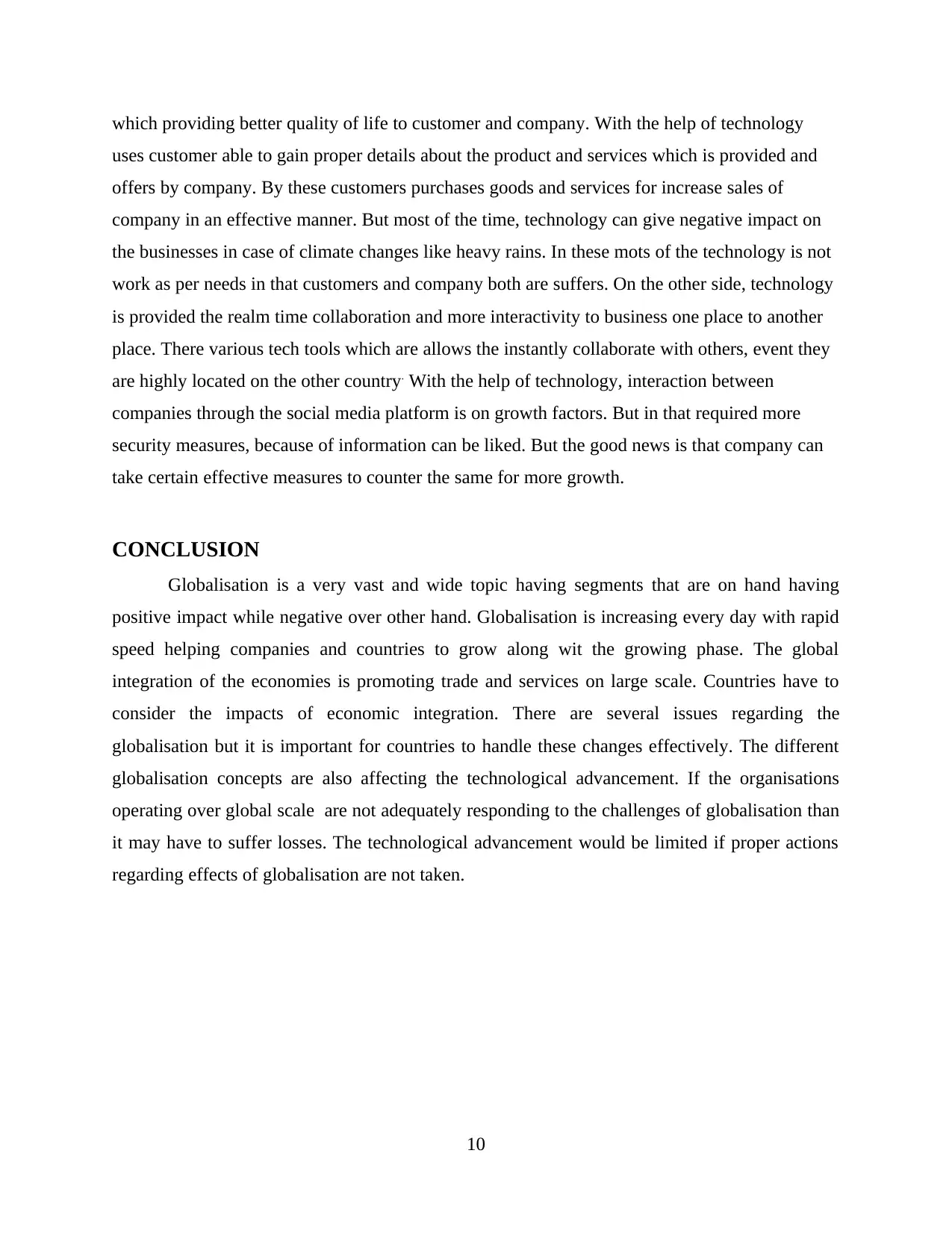
which providing better quality of life to customer and company. With the help of technology
uses customer able to gain proper details about the product and services which is provided and
offers by company. By these customers purchases goods and services for increase sales of
company in an effective manner. But most of the time, technology can give negative impact on
the businesses in case of climate changes like heavy rains. In these mots of the technology is not
work as per needs in that customers and company both are suffers. On the other side, technology
is provided the realm time collaboration and more interactivity to business one place to another
place. There various tech tools which are allows the instantly collaborate with others, event they
are highly located on the other country. With the help of technology, interaction between
companies through the social media platform is on growth factors. But in that required more
security measures, because of information can be liked. But the good news is that company can
take certain effective measures to counter the same for more growth.
CONCLUSION
Globalisation is a very vast and wide topic having segments that are on hand having
positive impact while negative over other hand. Globalisation is increasing every day with rapid
speed helping companies and countries to grow along wit the growing phase. The global
integration of the economies is promoting trade and services on large scale. Countries have to
consider the impacts of economic integration. There are several issues regarding the
globalisation but it is important for countries to handle these changes effectively. The different
globalisation concepts are also affecting the technological advancement. If the organisations
operating over global scale are not adequately responding to the challenges of globalisation than
it may have to suffer losses. The technological advancement would be limited if proper actions
regarding effects of globalisation are not taken.
10
uses customer able to gain proper details about the product and services which is provided and
offers by company. By these customers purchases goods and services for increase sales of
company in an effective manner. But most of the time, technology can give negative impact on
the businesses in case of climate changes like heavy rains. In these mots of the technology is not
work as per needs in that customers and company both are suffers. On the other side, technology
is provided the realm time collaboration and more interactivity to business one place to another
place. There various tech tools which are allows the instantly collaborate with others, event they
are highly located on the other country. With the help of technology, interaction between
companies through the social media platform is on growth factors. But in that required more
security measures, because of information can be liked. But the good news is that company can
take certain effective measures to counter the same for more growth.
CONCLUSION
Globalisation is a very vast and wide topic having segments that are on hand having
positive impact while negative over other hand. Globalisation is increasing every day with rapid
speed helping companies and countries to grow along wit the growing phase. The global
integration of the economies is promoting trade and services on large scale. Countries have to
consider the impacts of economic integration. There are several issues regarding the
globalisation but it is important for countries to handle these changes effectively. The different
globalisation concepts are also affecting the technological advancement. If the organisations
operating over global scale are not adequately responding to the challenges of globalisation than
it may have to suffer losses. The technological advancement would be limited if proper actions
regarding effects of globalisation are not taken.
10
⊘ This is a preview!⊘
Do you want full access?
Subscribe today to unlock all pages.

Trusted by 1+ million students worldwide
1 out of 15
Related Documents
Your All-in-One AI-Powered Toolkit for Academic Success.
+13062052269
info@desklib.com
Available 24*7 on WhatsApp / Email
![[object Object]](/_next/static/media/star-bottom.7253800d.svg)
Unlock your academic potential
Copyright © 2020–2026 A2Z Services. All Rights Reserved. Developed and managed by ZUCOL.





